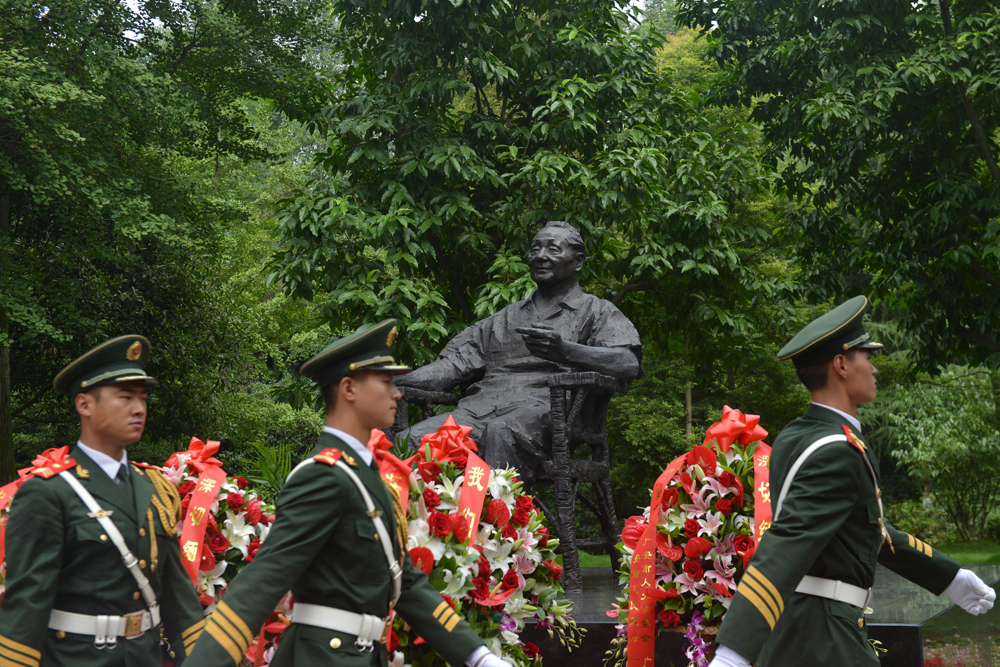
Reclaiming Deng’s Legacy from Liberals
Publication: China Brief Volume: 14 Issue: 16
By:

Celebrating reform-era leader Deng Xiaoping’s 110th birthday two days early on August 20, China’s leaders sought to harness his legacy for today’s politics by claiming him as a socialist and a uniquely Chinese thinker. While Deng is best remembered for implementing market reforms and opening China to the outside world, speeches and official commentary argued, he was neither a capitalist nor a Westernizer. Official messages also highlighted Deng’s reform and opening policies, likening their “courage and innovation” to that of the current leadership’s reform agenda, but they consistently did so in ways that leave no room for advocates of Western-style reform.
Putting Socialism Back in “Socialism With Chinese Characteristics”
Following in Deng’s footsteps today requires that China “never forget its roots,” said President Xi Jinping. “The independent path, theory and system are key to the sovereignty and dignity of our country as well as the self-esteem and independence of the Chinese nation,” he added, in a part of his speech highlighted by official coverage. “We will try our best to reform areas that are weak and unsound and learn from the good experiences of foreign countries, but we will never completely copy the foreign experience let alone absorb bad things from them” (translation Xinhua, August 20; full-text People’s Daily, August 20). Speeches made by other high-ranking officials applied these lessons to ideology, the military and provincial government (People’s Daily, August 20).
This interpretation of Deng’s legacy—as a natural development in the history of Chinese socialism, rather than a rejection of the Mao era—was highlighted in coverage of Xi’s speech, given at a forum of the Chinese Communist Party’s top echelons, and echoed in commentaries published across the spectrum of Chinese official media. The ideological journal Red Flag carried a long commentary using Deng’s “Four Cardinal Principles” to answer liberals who believe that Marxism is holding China back, while the website of mass-audience broadcaster CCTV reminded readers that “socialism can make use of a market economy” and of Deng’s statements that socialism is a superior system (Qstheory.com, August 20; CNTV.com, August 20). The Red Flag article also addressed democracy, reminding readers that Deng had chosen a “people’s democratic dictatorship” over “bourgeois democracy.” It also used a code word for foreign-backed subversion to accuse liberals of seeking to undermine China, describing their views as the belief that the Four Cardinal Principles (upholding the road of socialism, the dictatorship of the proletariat, the leadership of the Communist Party, and Maoism and Marxism-Leninism) are “a stumbling block to China’s ‘peaceful evolution.’”
The effort to distinguish Deng from Western-inspired liberals is reminiscent of the themes of Xi’s visit to Europe earlier this year, where he told audiences that China had “experimented with constitutional monarchy, imperial restoration, parliamentarism, a multi-party system and presidential government, yet nothing really worked. Finally, China took on the path of socialism” (see China Brief, April 9). While this week’s messages drew on very different sources—Communist theory rather than the language of civilizations—both led to the same conservative conclusion: China’s destiny requires the leadership of the Communist Party and resistance to copying Western political ideas.
Implications
Ideological threats and subversion have been a major theme of the Xi leadership, with repeated high-level warnings and an ongoing wave of arrests of intellectuals and human rights advocates. Beijing clearly retains the belief that Western governments, in cooperation with Chinese dissidents, seek to undermine the regime. However, continuing efforts to reject “Western” ideology do not appear to have deterred party leaders from seeking pro-market reforms or attempting to rein in abuses of power—and indeed, China today is far more marketized and open to the world than it was at the time of Deng’s retirement or 1997 death. While fearful of threats to China’s political system, the Deng commemorations were equally clear on the need for further reform, reiterating the long-standing argument that economic growth, cleaner government and respect for the people are the keys to the survival of party rule.
Given his efforts to shore up faith in China’s system—and to stamp out its most vocal domestic critics—it appears that Xi feels it is especially vulnerable during his aggressive overhaul efforts. But his pleas in Europe for respect for China’s distinct civilization and “choice of development path,” more vaguely put to the United States as part of the “New Type of Great Power Relations” concept, suggest that he believes it is possible to negotiate an ideological ceasefire. As long as Xi is pursuing difficult political goals at home, it is likely that other countries will have to deal with a China that is especially suspicious of their intentions and sensitive to even mild criticism.





